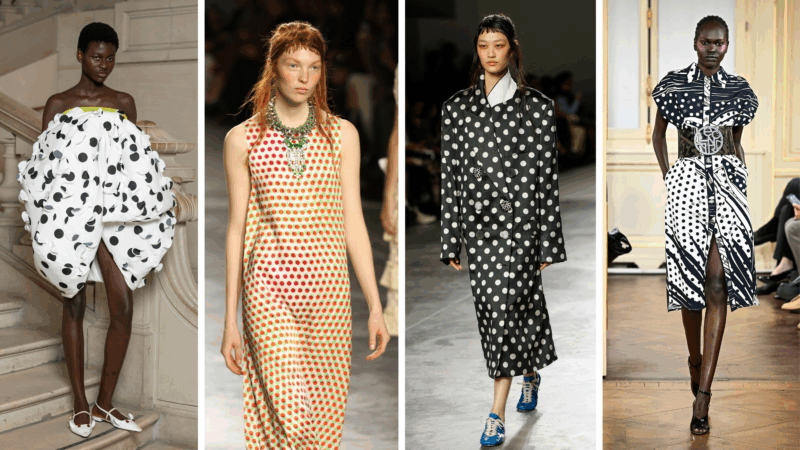Here’s how the fashion industry is using AI to predict the next big trend
Predicting what matters in fashion was once an elite sport, the province of those who attend those big runway shows in New York, Milan, London, and – right now – Paris, like the editors of influential magazines. (A line from 2006’s The Devil Wears Prada, about Miranda Priestly, a tyrannical fashion editor, conveys the idea succinctly: “You still don’t get it do you? Her opinion is the only one that matters.”)
While elite opinions continue to carry weight, the trend prediction game has expanded enormously over the past decade. Platforms like TikTok, Instagram and Pinterest are redefining how trends spread. According to a report from the data company Launchmetrics, more than 40% of global consumers purchased apparel and accessories at least three times via social media in 2024.
“There is more information available, certainly,” said Amy Sullivan, vice president of buying and private brands at the online fashion retailer and styling service Stitch Fix. “And I think the trends because of social media move faster.”
With so much data floating around, fashion industry players are leaning on AI in order to remain competitive.
Sullivan said AI recently helped her team decide whether to go with a red or blue stripe shirt for next Spring.
“In the past, to answer that question, you either make a spot decision without really looking at it, or you’re requesting samples from vendors overseas that could take weeks and cost a lot of money,” Sullivan said. “But when this happened a few weeks ago, we just put it into AI and you can actually see it in a full on-body image and make the right decision.”
They went with the blue.
How AI is used to make predictions
AI algorithms are helping the fashion industry on a number of fronts including the creation of personalized customer experiences, such as allowing customers to “try on” clothes virtually, supply chain management, and image generation. Its use in figuring out what’s likely to fly off racks next season involves mining data from many different places.
“Our models track everything from runway shows to social media,” said Noémie Voyer, the fashion expertise lead at Heuritech. The Paris-based company works with such brands as New Balance, Skims and Prada. “We have a massive scale of data that allows our AI to detect early signals of trends – sometimes months before they become visible on the mainstream market.”
Voyer said her company’s algorithms successfully predicted a bunch of emerging trends for next year. Examples include dotted prints, the flat-thong sandal and the color yellow. These trends have all shown up on runways at this year’s fashion weeks. Eventually, they’ll appear in Target and H&M.
But Voyer and the other sources NPR spoke with for this story all agree that AI cannot do fashion prediction on its own.
“While our AI is extremely sophisticated, the human [aspect] still remains essential,” Voyer said.
Human expertise is still necessary
“We can use AI to supercharge what we do,” said Francesca Muston, chief forecasting officer at the global consumer trend forecasting company, WGSN, which counts Levi’s and Coach among its clients. “But you have to really start putting a lot of rigor and a lot of process into what you’re doing.”
Muston said AI is excellent at efficiently predicting things like how much of a popular item a retailer should stock. But she said her company’s human experts have to ensure the information the AI provides doesn’t lead to the wrong conclusions.
“When you are looking online at social media, trends can blow up and feel huge,” Muston said. “But entertainment and commerciality are two different things.”
Muston said it’s one thing for an entertaining fashion post on social media to get a lot of engagement. But it’s quite another for someone to go out and buy the featured item: “Are they actually going to go away and spend some money and wear it to the bar after work?”
Homeland Security suspends TSA PreCheck and Global Entry airport security programs
The U.S. Department of Homeland Security is suspending the TSA PreCheck and Global Entry airport security programs as a partial government shutdown continues.
FCC calls for more ‘patriotic, pro-America’ programming in runup to 250th anniversary
The "Pledge America Campaign" urges broadcasters to focus on programming that highlights "the historic accomplishments of this great nation from our founding through the Trump Administration today."
NASA’s Artemis II lunar mission may not launch in March after all
NASA says an "interrupted flow" of helium to the rocket system could require a rollback to the Vehicle Assembly Building. If it happens, NASA says the launch to the moon would be delayed until April.
Mississippi health system shuts down clinics statewide after ransomware attack
The attack was launched on Thursday and prompted hospital officials to close all of its 35 clinics across the state.
Blizzard conditions and high winds forecast for NYC, East coast
The winter storm is expected to bring blizzard conditions and possibly up to 2 feet of snow in New York City.
Norway’s Johannes Klæbo is new Winter Olympics king
Johannes Klaebo won all six cross-country skiing events at this year's Winter Olympics, the surpassing Eric Heiden's five golds in 1980.







